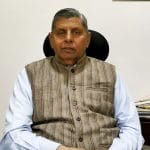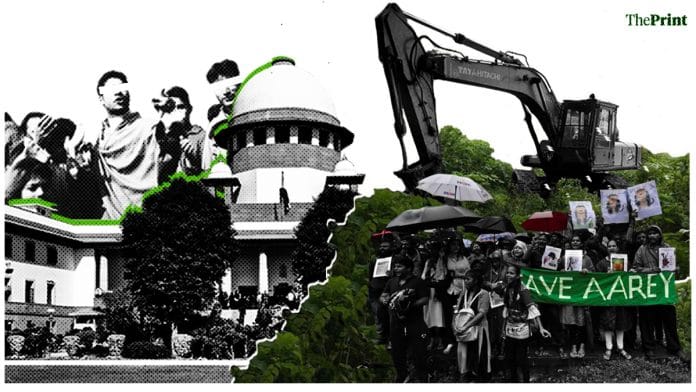The Supreme Court Monday stayed the cutting of trees in Aarey for Mumbai metro. The SC order came on a PIL filed as a letter by a law student Sunday. Earlier, CJI Ranjan Gogoi-led bench had said it has no time to hear petitions against scrapping of Article 370 and Kashmir lockdown since 5 August because it was hearing the Babri Masjid-Ram Janmabhoomi case.
ThePrint asks: Supreme Court stays Aarey felling: Is it prioritising trees over Kashmir & civil liberties?
Aarey matter can’t be compared with other cases. Even a day’s delay would have meant no trees left
 Justice B.S. Chauhan
Justice B.S. Chauhan
Former Chairman of Law Commission of India & former judge of Supreme Court
On the Supreme Court staying the felling of Aarey trees for the Mumbai metro car shed, we need to realise that it is not a question of priorities. It is a matter that cannot be compared with other cases. This is because if it did not hear the case Monday, then there would have been no trees left for the court to take a decision on.
This is because once the trees have been axed, they cannot be restored, at least not for several years. This must have been the main reason for the Supreme Court’s urgency in taking up the Aarey matter.
The Supreme Court is currently very busy with hearing the Babri Masjid-Ram Janmabhoomi title dispute case because it has to announce its final judgment before Chief Justice of India Ranjan Gogoi retires on 17 November.
If it does not decide the case by that time, then the entire exercise of constituting the constitutional bench and trying to resolve the issue through mediation will go to waste. A fresh bench will have to be constituted then, which would mean restarting the entire process. Thus, the question is not about priorities but about completing the hearings within the stipulated time.
Also read: Supreme Court stops cutting of Aarey trees for now, orders release of arrested activists
Shameful that Supreme Court has not shown similar urgency in Kashmir cases
 Salman Soz
Salman Soz
Kashmiri politician and author
The Indian government stripped Jammu and Kashmir of its special status on 5 August. Despite the promises made by India’s founding fathers, and the Supreme Court reiterating Article 370’s acquired status of permanence on two occasions, the Modi government subverted the Constitution in pursuit of its political agenda.
Knowing its decision’s unpopularity, especially in Kashmir, the security forces put almost the entire political leadership in the region under house arrest, imposed restrictions on movement of people, blocked mobile and internet services, and curtailed press freedom. In Kashmir, an emergency-like situation is in place. The Modi government has also suspended people’s basic rights.
The Supreme Court received numerous petitions against the government’s decision to dilute Article 370. However, the court has shown unusual deference to the Modi government. The government’s decision takes effect on 31 October. After a long delay, a constitutional bench has been set up that will begin hearing the petition only on 14 November.
In contrast to the J&K situation, the Supreme Court quickly ordered status quo in Aarey forest case. Without taking anything away from the importance of the Aarey case, it is shameful that the Supreme Court has not shown similar urgency for Jammu and Kashmir’s cases. It should have taken suo motu cognisance of this desecration of the Indian Constitution, but it has done the opposite. One can only wonder what priorities the Supreme Court has set for itself, being the ultimate protector of basic rights enshrined in the Indian Constitution.
Views are personal
Supreme Court sees upper-middle class and anglophone elites as its natural allies
 Alok Prasanna
Alok Prasanna
Senior Resident Fellow, Vidhi Centre for Legal Policy
To anyone who has read Anuj Bhuwania’s book “Courting the People”, the alacrity with which the Supreme Court moved to hear a petition initially filed as a letter and stay the cutting of trees in the Aarey forest should come as no surprise. The Supreme Court sees the upper-middle class and the anglophone elites as its natural allies in its assertion of unaccountable power. This is also why the same court first ordered the displacement and eviction of forest dwellers and Adivasis on 13 February, ostensibly to “protect” the forests at the behest of the upper-middle class and anglophone elites.
Whether it has been the eviction of the underprivileged from their homes or diluting laws that protect discriminated sections of Indian society or the shutting down of industries and commercial establishments in the name of pollution, the Supreme Court has always reflected the values of the dominant groups in society. The same dominant groups are also over-represented in the high courts and the Supreme Court, in terms of judges and senior lawyers.
This also explains why the Supreme Court has remained indifferent to the fate of Kashmiris or the people excluded from the National Register of Citizens. The only instances when it inflicts the same indifference on the rich and the elite is when the government of the day wants to settle political scores with certain members of this affluent class.
The Supreme Court’s concerns for civil liberties and environmental protection are, therefore, pure humbug — lofty rhetoric to be bandied about when convenient, and dropped at a moment’s notice when it’s not.
Also read: No phones, no internet & little freedom: Why I took part in Srinagar journalists’ protest
Aarey case more crucial than Kashmir issue since it’s about damage to environment & entire humankind
 Stalin D
Stalin D
Director, Vanashakti
The Kashmir issue is a question of civil rights and also of national security, so one cannot tell the courts how to handle the petitions. Moreover, the Ram Mandir issue is of importance to crores of people. Similarly, the Aarey matter is extremely crucial because it concerns environmental damage and destruction of Mumbai’s only patch of green cover.
The arrest and detention of 29 protesters is completely unacceptable in a democracy, considering that they were only fighting to protect the environment by conducting a non-violent protest, holding placards and forming a human chain. The government cannot take an aggressive stance on this matter.
On the other hand, Kashmiris were engaging in violent protests, pelting the security forces with stones. Had they not been doing it, then people would not have been detained. Their anger may be justified but their methods are not.
The Aarey matter is more crucial than the Kashmir issue because it pertains to damage being caused to mother nature, and eventually to the entire humankind. The Kashmir issue is regarding only a certain section of society.
By not giving priority to human rights, Supreme Court is failing in its constitutionally-mandated duty
 Maneesh Chhibber
Maneesh Chhibber
Senior columnist
The Supreme Court doesn’t have time to hear cases of human rights violations. Many, including jurists, would argue that by not giving priority to human rights over almost everything else, the Supreme Court is failing in its constitutionally-mandated duty.
The Supreme Court has been busy hearing the Ayodhya dispute case — CJI Ranjan Gogoi has made it his mission to announce the verdict before his retirement next month.
The Supreme Court took its own time to hear several habeas corpus cases involving the people of Jammu and Kashmir. Its orders did not bring any credit to the court.
So, when it decided to treat a letter written by a law student as a PIL and set up a special bench to hear the plea challenging the Bombay High Court’s decision in Mumbai’s Aarey case, questions were bound to arise.
It is nobody’s argument that protecting the environment shouldn’t be a priority for our courts. But safeguarding the rights of the citizens, especially those detained without any justifiable cause, should trump the fight to protect 2700-odd trees.
And, as if its own misplaced action in the Aarey matter wasn’t enough, the statement made in court by the Solicitor General Tushar Mehta, representing the Maharashtra government, left nobody in doubt that the Supreme Court had erred in handling the case. Mehta told the court that the required number of trees had already been cut – that the government’s purpose had been served. So, one could wonder what exactly the Supreme Court was hoping to achieve by holding a hearing on a closed day when everybody knew the case was infructuous.
By Revathi Krishnan, journalist at ThePrint







Most of these contributors are jokers. The first thing I want to know from the Director of “Vanashakti” is, who funds your organization?
The Supreme Court doesn’t care about Kashmiris or civil liberties. As someone has rightly said, it is concerned only about things that matter to the elite.
It has to just look at how the UK Supreme Court has reacted when called upon to uphold the constitution.
It has failed in its duties of upholding the Constitution.
SC has no time for Kashmiris whose throat has been cut some fifty days back but was quick to stop cutting of trees.
It should not be seen as an Either or binary. Or even in terms of prioritising which issue is more important. The swift response to a student’s letter, treating it as a PIL, is in the finest traditions of the Supreme Court. Propriety demanded that the authorities should have awaited its finding, before rendering it infructuous. 2. On Kashmir, the Court has allowed the executive the widest possible latitude, deferring to its judgment on a sensitive issue involving national security. A very balanced edit in HT sums up the mood of various stakeholders, including the international community. Time to open the wrapper and see the chocolate eclair that lies inside.